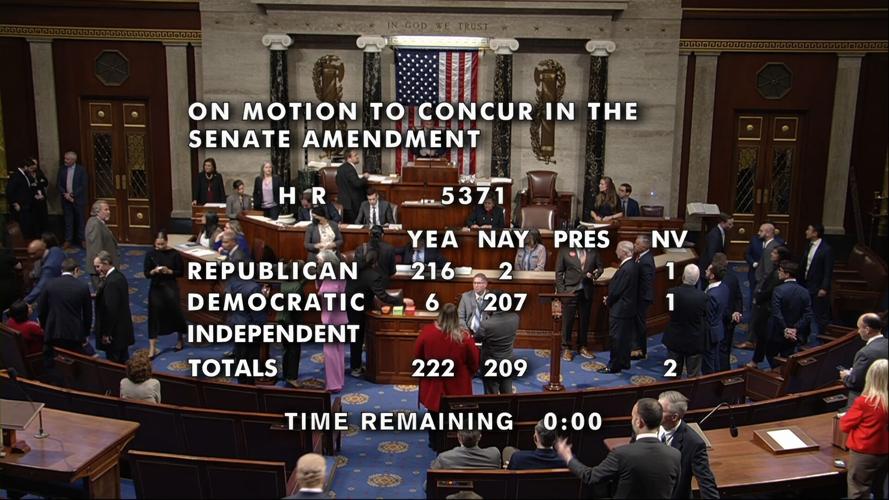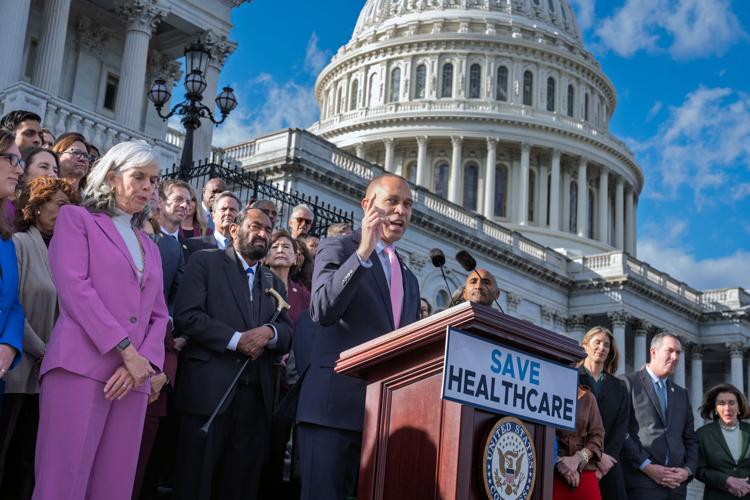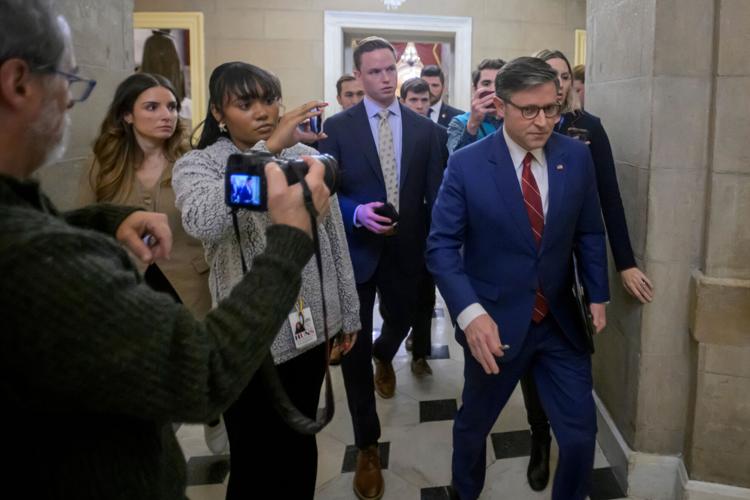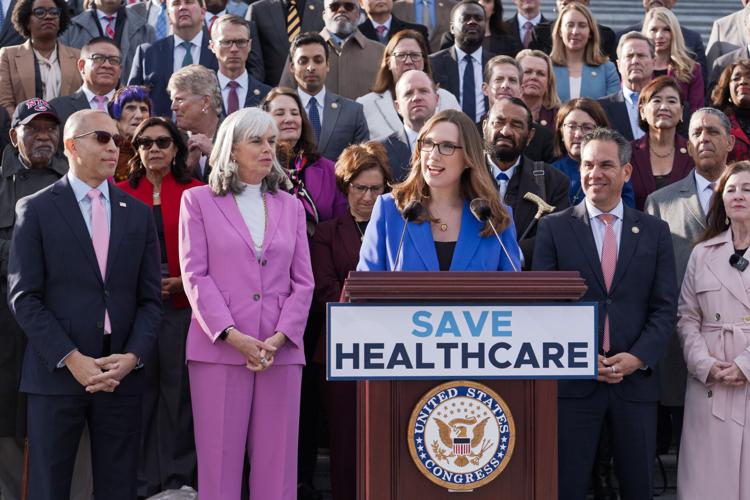WASHINGTON ŌĆö The House passed a bill Wednesday to end the nation's longest government shutdown, sending the measure to President Donald Trump for his signature after a historic 43-day funding lapse that saw federal workers go without multiple paychecks, travelers stranded at airports and people lining up at food banks to get a meal for their families.
House lawmakers made their long-awaited return to the nation's capital this week after nearly eight weeks away, with Republicans using their slight majority to get the bill over the finish line by a vote of 222-209. The Senate already passed the measure. Trump called the bill a "very big victory."
Democrats wanted to extend an enhanced tax credit expiring at the end of the year that lowers the cost of health coverage obtained through Affordable Care Act marketplaces. They refused to go along with a short-term spending bill that did not include that priority.
People are also reading…
But Republicans said that was a separate policy fight to be held at another time. They eventually prevailed, but only after the shutdown took an increasing toll on the country.

The vote total showing passage of the bill in the House to end the government shutdown is displayed┬ĀWednesday┬Ā at the Capitol in Washington.
"We told you 43 days ago from bitter experience that government shutdowns don't work," said Rep. Tom Cole, the Republican chairman of the House Appropriations Committee. "They never achieve the objective that you announce. And guess what? You haven't achieved that objective yet, and you're not going to."
The shutdown magnified the stark partisan divisions within Congress, and that split screen was reflected when lawmakers debated the measure on the House floor.
Republicans said Democrats sought to use the pain generated by the shutdown to prevail in a policy dispute.
"Stop imposing the suffering," House Majority Leader Steve Scalise, R-La., said. "Let's open the government. Let's get back to the work of the American people."
Democrats said Republicans raced to pass tax breaks earlier this year that they say mostly will benefit the wealthy, but the bill before the House Wednesday "leaves families twisting in the wind with zero guarantee there will ever, ever be a vote to extend tax credits to help everyday people pay for their health care," said Rep. Jim McGovern, D-Mass.

House Minority Leader Hakeem Jeffries, D-N.Y., and fellow Democrats speak about the health care funding fight Wednesday┬Āon the steps of the House at the Capitol in Washington before votes to end the government shutdown.
Democratic leader Hakeem Jeffries said Democrats would not give up even if the vote did not go their way.
"This fight is not over," Jeffries said. "We're just getting started."
The House had not been in legislative session since Sept. 19, when it passed a short-term measure to keep the government open when the new budget year began in October. House Speaker Mike Johnson, R-La., sent lawmakers home after that vote and put the onus on the Senate to act.
Johnson said the Democratic opposition to the spending bill was pointless, adding "it was wrong, it was cruel."
"They knew it would cause pain and they did it anyway," he said.

Speaker of the House Mike Johnson, R-La., talks with reporters Wednesday as he walks from the House chambers at the U.S. Capitol in Washington.
The compromise to end the shutdown
The legislation included buy-in from eight senators who broke ranks with the Democrats after reaching the conclusion that Republicans would not bend on using a government funding to bill to extend the health care tax credits. Meanwhile, the shutdown's toll was growing by the day.
The compromise funds three annual spending bills and extends the rest of government funding through Jan. 30. Republicans promised to hold a vote by mid-December to extend the health care subsidies, but there is no guarantee of success.
"We had reached a point where I think a number of us believed that the shutdown had been very effective in raising the concern about health care," said Sen. Jeanne Shaheen, D-N.H. The promise for a future vote "gives us an opportunity to continue to address that going forward."
The legislation includes a reversal of the firing of federal workers by the Trump administration since the shutdown began. It also protects federal workers against further layoffs through January and guarantees they are paid once the shutdown is over.
The bill for the Agriculture Department means people who rely on key food assistance programs will see those benefits funded without threat of interruption through the rest of the budget year.
The package includes $203.5 million to boost security for lawmakers and an additional $28 million for the security of Supreme Court justices.
Democrats also seized on language that would give senators the opportunity to sue when a federal agency or employee searches their electronic records without notifying them, allowing for up to $500,000 in potential damages for each violation. Democrats called for removal of the provision.
The language seems aimed at helping Republican senators pursue damages if their phone records were analyzed by the FBI as part of an investigation into Trump's efforts to overturn his 2020 election loss to Democrat Joe Biden. The provisions drew criticism from Republicans as well. Rep. Austin Scott, R-Ga., said he's already introduced repeal legislation that he hoped would be voted on quickly.
The biggest point of contention, though, was the fate of the expiring enhanced tax credit that makes health insurance more affordable through Affordable Care Act marketplaces.
Most Democrats call the passage of the spending bill this week a mistake. Senate Democratic leader Chuck Schumer of New York, who received blowback from his party in March when he voted to keep the government open, said the bill "fails to do anything of substance to fix America's healthcare crisis."
Without the enhanced tax credit, premiums on average will more than double for millions of Americans. More than 2 million people would lose health insurance coverage altogether next year, the Congressional Budget Office projected.

Rep. Sarah McBride, D-Del., center, joins House Minority Leader Hakeem Jeffries, D-N.Y., far left, and fellow Democrats as they advocate for improving the health care funding system┬ĀWednesday on the steps of the House at the Capitol in Washington.
Health care debate ahead
It's unclear whether the parties will find any common ground on health care before the December vote in the Senate. Johnson said he will not commit to bringing it up in his chamber.
Some Republicans have said they are open to extending the COVID-19 pandemic-era tax credits as premiums will soar for millions of people, but they also want new limits on who can receive the subsidies. Some argue that the tax dollars for the plans should be routed through individuals rather than go directly to insurance companies.
Sen. Susan Collins, R-Maine, chair of the Senate Appropriations Committee, said Monday that she was supportive of extending the tax credits with changes, such as new income caps. Some Democrats have signaled they could be open to that idea.
House Democrats expressed great skepticism that the Senate effort would lead to a breakthrough.
Rep. Rosa DeLauro of Connecticut, the top Democrat on the House Appropriations Committee, said Republicans have wanted to repeal the health overall for the past 15 years. "That's where they're trying to go," she said.
Monthlong government shutdown in photos: Disruptions, delays and divisions

Volunteer Betty McNeely, right, helps a man bag food items Oct. 28 at Project Feed, an emergency food pantry in Portland, Maine.┬ĀWith no endgame in sight, the U.S. government shutdown is expected to roll on for the unforeseeable future, injecting more uncertainty into an already precarious economy.

Brock Brooks, a disable Marine Corps veteran, cries Oct. 30 while describing the impending SNAP shutdowns while waiting in line to enter the food pantry service at Calvary Episcopal Church in Louisville, Ky. Funding for the Supplemental Nutrition Assistance Program, or SNAP, lapsed Saturday.

Volunteers prepare emergency food packages Oct. 28 at the Tarrant Area Food Bank in Fort Worth, Texas.

Tammy Norton, a furloughed federal employee of 16 years who currently works for the Internal Revenue Service, reacts with emotion Oct. 28 as she talks about running through her limited savings to support her family during the government shutdown, at a food distribution center for federal employees affected by the government shutdown in Dania Beach, Fla.┬ĀThe monthlong government shutdown halted routine federal operations, furloughed about 750,000 federal employees and left others working without pay.

Volunteer Joel Hernandez helps load a vehicle Oct. 27 during a food distribution targeting federal employee households affected by the federal shutdown as well as SNAP recipients in San Antonio.

A food and supplies bank is set up Oct. 17 at Harry Reid International Airport in Las Vegas, Nv.

House Minority Leader Hakeem Jeffries, D-N.Y., disputes a reporter's question Oct. 24 as he enters his office┬Āat the Capitol in Washington on day 24 of the government shutdown.

The Capitol is seen at nightfall Oct. 22, day 22 of a government shutdown, in Washington.

Sen. John Barrasso, R-Wyo., the Senate GOP whip, left, and Speaker of the House Mike Johnson, R-La., arrive for a news conference with top Republicans on the government shutdown Oct. 1 at the Capitol in Washington.

Air Traffic Controllers stand Oct. 28 outside Detroit Metropolitan Wayne County Airport in Romulus, Mich., distributing leaflets explaining how the federal government shutdown is affecting air travel.┬ĀAirports have been scrambling with flight disruptions.

Travelers sit together and wait Oct. 2 at the Baltimore/Washington International Thurgood Marshall Airport in Baltimore.

TSA agent Sashene McLean, holding her 1-year-old daughter, comes from work to collect a donation of produce, meat and yogurt Oct. 28 at a food distribution center in Dania Beach, Fla., organized to assist federal employees missing paychecks during the government shutdown.

Senate Majority Leader John Thune, R-S.D., speaks to reporters Sept. 30 at the U.S. Capitol in Washington as the U.S. government was on the brink of the first federal government shutdown in almost seven years.

Speaker of the House Mike Johnson, R-La., and GOP leaders, from left, Rep. Lisa McClain, R-Mich., and Majority Whip Tom Emmer, R-Minn., blame the government shutdown on Democrats during an┬ĀOct. 2 news conference at the Capitol in Washington.┬ĀAmericans, meanwhile, are divided on whoŌĆÖs to blame.

Senate Minority Leader Chuck Schumer, D-N.Y., attends a Sept. 30 news conference about the government shutdown on Capitol Hill in Washington. Democrats seek an extension of expiring tax credits that helped millions of people afford health insurance, while Republicans say they wonŌĆÖt negotiate until the government is reopened.










